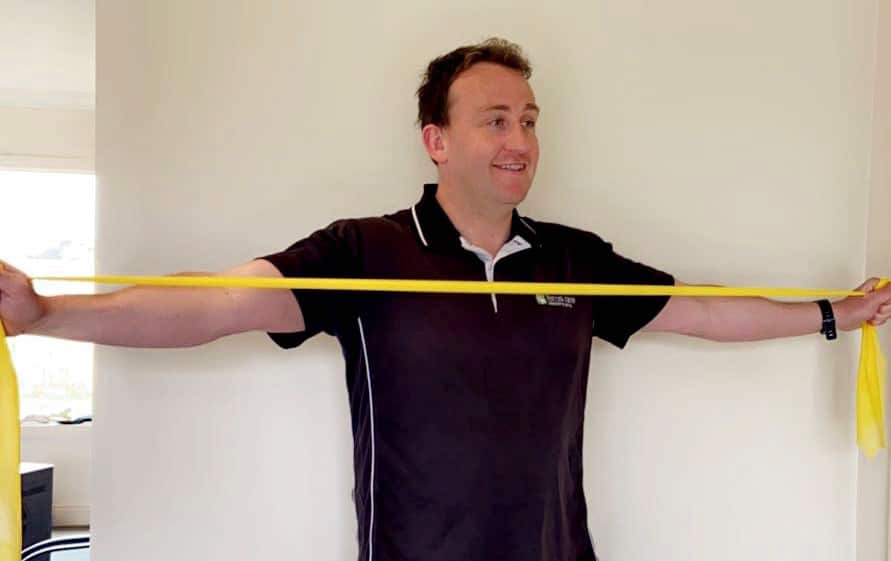
3 reasons to become an Exercise Physiologist with Feros Care
Josh Cahir has been an Exercise Physiologist with Feros Care for six years.
Based in Ballarat and servicing the entire Grampians region, he found himself naturally drawn to the role after completing an undergraduate degree in Exercise and Sports Science, followed by post graduate studies in Clinical Exercise Physiology.
“I’ve always had a passion for sport and exercise, leading to an interest in rehabilitation and helping people manage injuries,” Josh explains.
“With Exercise Physiologists (EPs) specialising in chronic disease management, working with people over the age of 65 was a big focus throughout my placements – and it felt really natural for me.”
Josh works directly with clients navigating eight-week Short-Term Restorative Care (STRC) programs, or those on ongoing Home Care Packages (HCP).
“The goal for every client is to assist them to remain living independently in their own home,” says Josh.
“The functional outcome measures we test – mobility, transfers, static balance, endurance, aerobic capacity – help us to objectively capture whether we’ve made improvements after the 8-12 week intervention. And when clients see the improvements
on paper, they really see that the exercises are helping and making a transferable improvement in their day to day tasks.”
Here are three things Josh loves about his role – and some of the reasons Exercise Physiologists may enjoy in an opportunity with Feros Care.
1. The client relationships you get to build
Early on in an exercise intervention, it’s super important to build initial rapport to get the client to buy in – and Josh likes to think that through their conversations, they help him as much as he helps them.
“Clients have so much to share, so much life experience and wisdom,” he says. “Some people are just so positive, considering their current circumstances with their health. Some of the resilience they show through tough times, their trauma
and grief – it just makes me really respect them and be grateful for everything I have.”
And just as it’s the small improvements in their lives that really make a difference to clients, it’s the small things that really stick with Josh.
“There’s one couple that welcome me like I’m a family member, they always have a cup of tea ready for me with a little cake or a biscuit,” Josh explains. “They ask about how my family is, or share something I might be able to learn from with how they’ve personally got through a tough time.”
“It’s just so welcoming, what they say and how they make you feel.”
Through building positive rapport with clients, this helps Josh to build trust – which in hand helps with yielding good results during the intervention.
“They’ve got trust in you and what you’re saying, and they look forward to you coming back, modifying and progressing the exercise program.”
“We had one client who had three falls over a six month period. EP was implemented to work on leg strength, static and dynamic balance. No further falls and an increase in confidence were reported. This client still continues their home exercises daily and implements the education provided”.
2. The diversity of the role
Josh’s day is broken up with a lot of travel throughout regional Victoria. He listens to clinical and self-development podcasts on the drive around the countryside, ready to be welcomed to each house and make a positive change.
The diversity isn’t just limited to travel. Josh uses a variety of techniques with clients, such a mindfulness to improve mental health and stress levels. Or he makes use of technology, setting clients up with smart watches so they can monitor steps, vitals and sleeping patterns.
“Six years in and I still love the variety of ways in which you can work with clients, both physically and mentally, to help them enjoy a better quality of life,” Josh says.
“Some may not be too receptive based on their initial reaction, but then usually you can win them over to give it a go, and as soon as they see improvements, they’re happy to implement it ongoing.”
3. The support from the wider Feros Care team
While Josh works remotely, he’s happy with how Feros Care supports him through monthly Allied Health meetings and planned face-to-face catchups annually in the Coolangatta office with the wider Clinical team.
“There’s such great support from the Clinical Team. We’re able to meet regularly and discuss certain case studies and topics. Everyone has so much knowledge and little gems, and they’re more than happy to share. I have an excellent mentor that helps me feel well-supported in my role.”
He also appreciates the flexibility. Josh’s young daughter was recently having a hard time at her day care centre, and the family had to come up with a new plan. Josh was able to cut back to four days per week for a six-month period, and take an additional 10 days off, using his sick and carers leave.
“My line manager has been very supportive throughout that time, it’s a really great culture that supports new parents.”
The bottom line, according to Josh
“I’d highly recommend an EP or Physiotherapist coming on board with Feros, immersing themselves in the culture as our footprint continues to grow,” Josh recommends.
“We reflect on our five core values regularly and attempt to implement them daily. Above all, we have a great team here that is making positive ripples in the community and the internal support provided allows us to do so.”
Ready to take on a new career as a Physiotherapist with Feros Care?
Feros Care is constantly looking for talented and energetic people to fill exciting career opportunities.